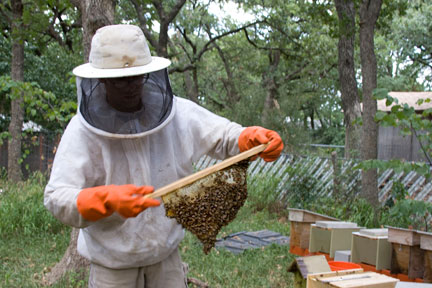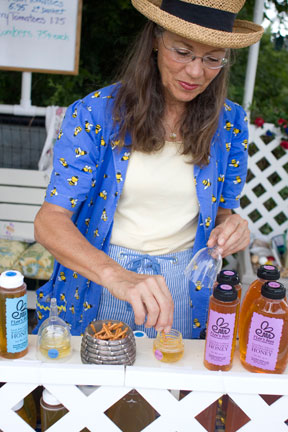Carefully placing his homemade bottle of mead on the table, Tim Hall whips out two glasses embellished with honeybees. As he proudly pours his drink, his words come out in a rush. The dozens of bee hives in Hall’s backyard on Normandy Road in the Meadowbrook area get him as excited as a 5-year-old on his first trip to the zoo.
His bookshelf is filled with books on natural foods and honey bees. Large jugs used for fermentation, called carboys, sit on his kitchen floor, accompanied by barrels of mead and jars of honey. On his front porch, a smoker, used for calming the bees, sits next to a white netted suit and hat, his armor against the insects.
 You could say Hall is crazy about bees. But he’s not the only one.
You could say Hall is crazy about bees. But he’s not the only one.
In Fort Worth and across the nation, beekeepers are struggling to meet rising demands for honey. Jimmy Oakley, treasurer for the Texas Beekeeper’s Association, said there are 16,000 beekeepers in the state. But only about 200 of those sell their products, and many of those sell all that their hives produce.
Much of the rising demand stems for increased public interest in the possible health effects of honey and other bee products. The Hibernation Diet, written by bee guru Mike McInness, suggests that two nightly spoonfuls of honey before bed can help people lose weight. Propolis, a tarry substance that bees produce from plants, is said to help heal wounds. But perhaps the most marketed health benefit is that locally produced honey can help people fight allergies.
If you Google “local honey allergies” about 450,000 results appear. Publications like Self magazine, Consumer Health Digest, and the Sacramento Press all report the stories of people whose allergies have disappeared after eating the natural sweetener.
Hall started his business, Batsmith Creek Beeyard, two years ago, after tiring of his original career as an architectural illustrator. He bought some hives from a local beekeeper and got started. He still draws occasionally but now relies on the bee business for most of his income. Not honey sales or bee products so much as the other side: bee removals. On 100-degree days, Hall drives all over Fort Worth to homes and businesses, removing bees that have built hives in homes and other structures. He charges anywhere from $60 to $300 and has stayed booked all summer.
On the other side of his business, nearly all of the phone calls Hall receives are from people looking for local honey to help their allergies, he said. The remedy has been used by herbalists for years, with the idea that eating small doses of the pollen that you’re allergic to will help build your immune system, eventually making allergies disappear. Hall collects honey only from the Fort Worth area so the pollen will be effective, he said.
The catch: The pollens ingested must be the ones you’re allergic to. That’s the problem that Dr. James Haden, an allergist at the Allergy and Asthma Clinic of Fort Worth, has with using honey as a cure. The basic idea is scientifically sound, he said, but there’s no way for consumers to know which pollens the bees are gathering.
“The bees don’t know what you’re allergic to,” he said. Most people are allergic to windborne pollens that come from grass and trees, but bees mostly gather flower pollens, he said.
 Another problem: You’d have to eat dozens of pounds of honey for it to be beneficial, the allergist said. There isn’t enough pollen in the natural sweetener to make a big impact.
Another problem: You’d have to eat dozens of pounds of honey for it to be beneficial, the allergist said. There isn’t enough pollen in the natural sweetener to make a big impact.
But Haden doesn’t want to discourage people from trying local honey for allergies. “I prefer it. It tastes better,” he said.
T’Lee Sollenberger has been keeping bees in Burleson for 10 years. She sells her honey from a roadside stand next to Country Vista Road. The stand is fashioned from white picket fence sections and water pipes, and the shelves are filled with plastic bottles of honey labeled in yellow, blue, purple, and white. Each color represents specific bee “yards,” or collections of hives.
Sollenberger, wearing yellow honey bee earrings and a bee-shaped pin, gives weekend customers samples of fresh figs and offers other products along with honey – chutney packaged in a bee-shaped jar, baskets of cherry tomatoes. Everything is organic. Her honey is local, raw (unpasteurized), and unfiltered.
On Sollenberger’s opening weekend in July, one family spent $100 for several bottles of her honey. Aliza Miller and her husband and three children stood in the afternoon heat, sampling the honey with pretzel sticks.
Miller has been a customer for six years. In 2003, her then 5-year-old son Rhys sniffed constantly. Because sniffing repetitively is a sign of autism, the school psychologist wanted to get Rhys tested.
Miller’s mother told her to try feeding Rhys spoonfuls of local honey, thinking the sniffing might be a sign of allergies. Miller tried it. Rhys’ problem cleared up within a week.
“It just worked,” she said.
Rhys is now a tall, wiry 11-year-old with a head full of blond hair and a clear voice. He eats a peanut butter and honey sandwich every day, and if he doesn’t have honey for about a month, the sniffles return.
During the Christmas months, it’s not unusual for Sollenberger to sell $1,500 worth of honey in one weekend, she said. While she doesn’t make a huge profit from her business, she enjoys working with the bees and selling natural products.
Selling her special creamed honey (which includes fine granules of honey, but no cream) means she has to carry liability insurance in case customers, despite warnings, use too much of it and have bad reactions. She adds extra pollen to the honey, selling 30 ounces for $27 to people with severe allergies. Sufferers are supposed to eat only a teaspoon a day, building their immune systems gradually. She said one man overdid it and came back the next day, complaining of vomiting and diarrhea.
“People can overdose,” Sollenberger said. “Their throat may swell up, their eyes may itch.”
Still, she said, it’s a popular item: “If I have it, I can’t keep it [on the shelves].”
Sollenberger said her honey works because she knows what pollens her bees gather. Because bees forage in about a 2.5-mile radius from their hives, she frequently walks through the pastures to identify the different plants and flowers from which her bees feed. This fall, she said, her bees will gather pollen from mesquite, mist flowers, and goldenrod.
T’Lee’s Bees has grown 30 percent each year since she started, Sollenberger said. When customers request half-gallon jugs of honey, she refuses because she can’t be sure that her bees will be able to produce enough honey to keep up with the demand. Sollenberger’s season begins in July and lasts until she runs out of honey. By Christmas, her inventory is exhausted.
The Sunflower Shoppe, just off Camp Bowie Boulevard, has seen an increase in customers requesting local honey, said Belinda York, the general manager and a certified nutritionist. The store has been selling about 12 to 15 more jars of honey per month in the last year, a trend that York attributes to the increasing construction in the 7th Street area. The construction dust in the air has given people allergies, she said.
York has been eating honey every day for the last 26 years to combat her allergies. She moved here from Stephenville and said she couldn’t breathe properly for the first year she lived in Fort Worth.
“I’m telling you, that 50-mile [difference] can kill a person,” she said. If she eats honey, she’s fine.
For Tim Hall, producing honey for his customers might not be an option this year. He has lost most of his hives because of colony collapse disorder, bee terminology for a colony that has lost its ability to ward off pests and insects. It’s Hall’s second year keeping bees, and – although he’s struggling – he says he won’t quit.
Eager to show off his hives, Hall headed to his backyard recently clad in only a t-shirt, jeans, and tennis shoes, he first smoked the bees to anesthetize them, then calmly pulled the lid off of a hive, revealing about 50,000 bees swarming on the honeycomb. One bee stung his ear, but he calmly swatted it away. Standing in the smoke, bees swarming around him, Hall held the long strip of honeycomb against the sky for inspection. He stuck his finger into it, licked the honey, and smiled.











